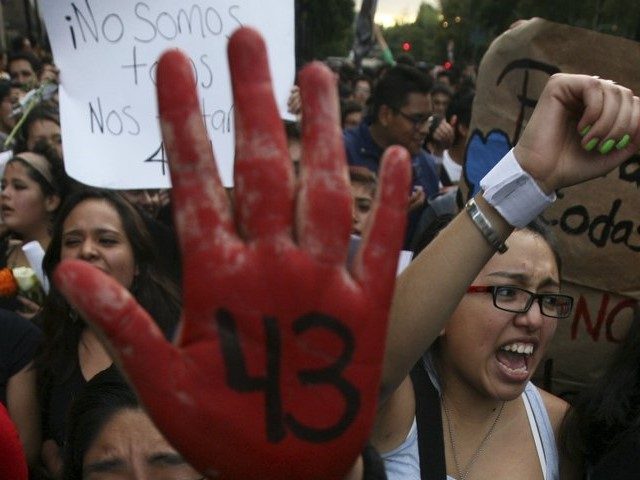Recorded conversations between drug traffickers intercepted by the Drug Enforcement Administration (DEA) in 2014 give clues about the fates of 43 students who disappeared at the hands of Mexican authorities and crime lords on September 26 of that year in Guerrero. The information about the massacre is again causing political headaches for those in power in Mexico.
In 2016, DEA handed the Mexican government 20 CDs which included transcripts of wiretaps of drug bosses from Guerreros Unidos in Chicago who were in communication with allies in Mexico. In the state of Guerrero, Guerreros Unidos was fighting against a criminal organization called Rojos.
The conversations include text messages from September 2014 between members of the cartel about the chaos that ensued after the forced disappearance of 43 students from the Raúl Isidro Burgos Rural Normal School in Ayotzinapa while they were in the city of Iguala.
The information provided by the DEA has been in the midst of controversy over differences in narratives presented by the cabinet of Mexican President Andres Manuel López Obrador (AMLO), independent investigations, and other agencies.
Journalistic versions, such as that of influential columnist Héctor de Mauleon, suggests DEA deliberately hid important information — mainly the content of the calls placed on September 26 and 27.
The Day of the Disappearances
On the night of September 26, students from Ayotzinapa arrived at the bus station in Iguala, Guerrero, to “borrow” two trucks they planned use to travel to a protest on October 2 in Mexico City.
Since one of the trucks had previously been loaded with drugs destined for Chicago by members of the Guerreros Unidos Cartel, the criminal organization thought that the students were Rojos members.
The leaders of Guerreros Unidos in Chicago ordered that the drugs be recovered and to “punish those responsible.” Both the DEA and Mexico tend to agree on this fact.
A report made by the government of then-Mexican President Enrique Peña Nieto claimed there was no evidence that local or federal authorities took part in the forced disappearance of the students. It also detailed that Guerreros Unidos confused the protesters for rival hit men.
However, the information from that report clashes with evidence presented in a U.S. court case against eight men accused of drug trafficking from Guerrero to Chicago which included intercepted calls and messages between Blackberries.
At the time of the massacre, U.S. authorities were constantly sharing information with their Mexican counterparts, even before the case with the students. Mexico had already been made aware of the trafficking in the region and how Mexican authorities at various levels were involved.
A new development came when another collection of intercepted conversations revealed the close collaboration of the Mexican Army with cartels as part of the Ayotzinapa case. The information was shared with the Special Unit for the Investigation and Litigation of the Ayotzinapa Case (UEILCA), a group created by AMLO.
In some documents shared with the newspaper El País, the UEILCA claims that 83 individuals took part in the case. The investigative unit points to two former Guerrero Police officers for torturing and killing a student named Julio Cesar Mondragon. The unit also alleges that the former President of the Guerrero Supreme Court and two state government computer scientists allegedly obstructed justice.
This year, AMLO’s government arrested former Attorney General Jesus Murillo Karam on allegations of torture and covering up key case facts. However, the arrest caused a rift between the head of the UEILCA, Omar Gómez Trejo, and then-current Mexican Attorney General, Alejandro Gertz Manero. The latter ordered the case to be fast-tracked while Gomez Trejo asked for additional time. Gertz Manero refused and removed Gomez Trejo from the case. Later, the attorney general approved the dismissal of 21 of the 83 arrest warrants, including 16 filed against members of Mexico’s Army.
DEA Leaks
One of the most striking conversations intercepted by the DEA is between the brothers and members of Guerreros Unidos, Adán Zenen Casarrubias and José Àngel Casarrubias, published by journalist Jorge Fernàndez Meléndez in his book La Noche de Iguala, Kidnapping, Murder and Drug Trafficking in Guerrero.
The conversations take place on September 26 and 27, 2014, and confirm the massacre was due to confusion since Guerreros Unidos believed their rivals had “infiltrated” the student group.
The testimonies of assassins involved in the case coincide with the DEA recordings.
Editor’s Note: Breitbart Texas traveled to Mexico City and the states of Tamaulipas, Coahuila, and Nuevo León to recruit citizen journalists willing to risk their lives and expose the cartels silencing their communities. The writers would face certain death at the hands of the various cartels that operate in those areas including the Gulf Cartel and Los Zetas if a pseudonym were not used. Breitbart Texas’ Cartel Chronicles are published in both English and in their original Spanish. This article was written by “Dharma Fernández” from Baja California

COMMENTS
Please let us know if you're having issues with commenting.